Windows and Doors in Tiny Homes: Keeping Condensation, Mold and Energy Loss at Bay
When you live in a tiny home—whether it’s a backyard studio, a mobile retreat or a compact starter house—every square inch counts. Windows and doors do more than let in light and fresh air: they’re critical to airflow, insulation and overall comfort. In small spaces, poor glazing or a draught door can quickly lead to condensation, mold, even ice on the glass in winter for super cold climates, from a dark Scottish Winter to the Nordics. A smart choice of uPVC windows and quality exterior doors will keep your tiny home cosy, healthy and energy-efficient for years to come.
Why Condensation Becomes a Big Issue
Condensation happens when warm, moisture-laden air meets a cold surface—like a windowpane or an uninsulated door. In a tiny home, everyday activities (cooking, showering, even breathing) quickly raise humidity. Without proper glazing:
Water droplets collect on glass, obscuring your view—and your light source.
Mold spores can find a foothold in window frames or around door jambs.
Wood rot or rust may develop if moisture lingers.
That’s why addressing condensation isn’t just a cosmetic issue; left unchecked, it can lead to health risks and expensive repairs down the road.
Double vs. Triple Glazing: What’s the Difference?
Most uPVC windows offer double glazing—two panes of glass separated by an insulating spacer. Triple-glazed units add a third pane and extra insulating gas (usually argon or krypton: yes, like Superman!). Benefits include:
Lower U-values (better insulation)
Reduced condensation thanks to a warmer inner pane
Quieter interiors by dampening outside noise
Higher R-values, keeping your heating bills down
In a tiny home, shifting to triple glazing can make a noticeable difference in preventing that “fogged up” feeling on cold mornings.
uPVC Windows: The Right Choice for Tiny Living
UPVC is the go-to frame material for many tiny-homes that we build at THC:
Durability—resists rot, corrosion and insect damage.
Low maintenance—no scraping or repainting required.
Affordability—more budget-friendly than wood or aluminium.
Energy efficiency—excellent thermal performance when paired with double or triple glazing.
Picking the Perfect Exterior Door
Just as important as your windows is the barrier at your entryway. A well-insulated exterior door in Canada serves several functions:
Thermal break—prevents heat transfer through the door slab.
Weatherstripping—stops draughts, dust and insects.
Security—a solid core or reinforced fiberglass adds peace of mind.
Curb appeal—lets you express style, from modern minimalism to classic craftsman.
Look for doors with a high R-value, thermal glazing inserts and multi-point locking systems to get the best performance in a tiny space.
Understanding Door Cost Before You Buy
Budgeting is key in any renovation. If you’re comparing options, use a reliable door cost estimator to gauge potential costs (this is a great example of one for Canada, so see what you can find in the U.K, USA or elsewhere):
Base price of the door slab
Upgrades (glass inserts, finishes, hardware)
Installation fees (labour, removal of old door, trim work)
In many cases, the total investment pays for itself through lower heating bills and fewer maintenance headaches down the line.
Preventing Mold and Ice on the Glass For Colder Days
Mold in a tiny home tends to appear:
Around window sills and door thresholds.
In the corners of rooms with poor airflow.
Keeping humidity between 30–50% with a dehumidifier or a heat-recovery ventilator (MVHR) goes a long way. And with triple glazing, the inner glass surface stays warmer—so you’re far less likely to see frost or ice build-up when temperatures dip below freezing.
Tips for a Healthy, Efficient Tiny Home
Regularly inspect seals around windows and doors for cracks.
Clean track channels to ensure smooth operation and tight closure.
Upgrade to Low-E coatings on glass to block infrared radiation.
Use curtains or blinds strategically to buffer nighttime temperature drops.
Monitor indoor humidity with a digital hygrometer to stay ahead of mold risks.
Pair these habits with high-performance vinyl products, and you’ll enjoy clear views, lower energy bills and a healthier living space—even in the smallest footprint.
Ready to Upgrade to a Top Performing Tiny?
Get your tiny home from THC - your premium tiny home builder!


